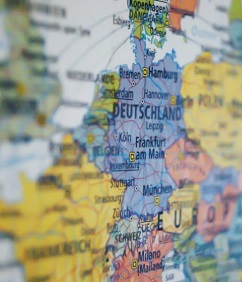
Scots and Europe
 Scots is the closest sister language of English but it has plenty of European cousins. Bearing in mind its Germanic origins, it should come as no surprise that the German word for cow is kuh. Dutch, Frisian and Flemish also have a lot in common with Scots – kennen for to know (Dutch), twa for two (Frisian) and broek for trousers (Flemish).
Scots is the closest sister language of English but it has plenty of European cousins. Bearing in mind its Germanic origins, it should come as no surprise that the German word for cow is kuh. Dutch, Frisian and Flemish also have a lot in common with Scots – kennen for to know (Dutch), twa for two (Frisian) and broek for trousers (Flemish).
And with a history interwoven with our neighbours across the North Sea, Scottish people already have a considerable knowledge of Scandinavian languages before opening a Danish, Norwegian or Swedish dictionary – hus for house (Danish), barn for child (Norwegian) and bra (pronounced braw) for good (Swedish).
Regional or minority languages
As well as the 23 official languages of the European Union, there are over 60 so-called regional or minority languages in Europe. In 2001, the United Kingdom signed the European Charter for Regional or Minority Languages, undertaking to recognise and promote Scots. The Charter also covers languages like Catalan, Occitan, Welsh, Frisian, Scottish Gaelic, Meankieli and Ladin.
Based in Friesland in the Netherlands, the excellent Mercator Research Centre runs the Network of Schools to promote the exchange of good practice in minority language education throughout Europe. A number of Scottish primary schools which teach Scots are already members.
Scots often features in the annual minority language Eurosong contest, Liet Lavlut.
Scots is an important and valued member of the family of modern European languages.
| ‘Everyone is entitled to all the rights and freedoms set forth in this
Declaration, without distinction of any kind, such as race, colour, sex,
language, religion…’ Article II, Universal Declaration of Human Rights |
Read the Universal Declaration of Human Rights in Scots.